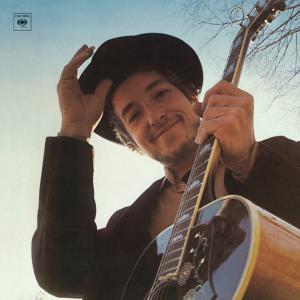
Nashville Skyline (1969)

1. Girl From the North Country
2. Nashville Skyline Rag
3. To Be Alone With You
4. I Threw It All Away
5. Peggy Day
6. Lay Lady Lay
7. One More Night
8. Tell Me That it Isn't True
9. Country Pie
10.Tonight I'll Be Staying Here With You
If John Wesley Harding had gently nudged Dylan into country terrain, Nashville Skyline saw him plant his boots firmly on Music Row. Released in 1969, this unexpected detour was less a reinvention than a reintegration—an artist known for disruption briefly embracing simplicity, charm, and the conventions of mainstream country music with uncharacteristic ease. It remains, in Dylan's restless catalogue, a singular entry: brief, polished, and wholly disarming.
Though it is often referred to as Dylan’s “country album,” that label alone fails to capture the sheer stylistic departure on display. Where John Wesley Harding was stark and sermon-like, Nashville Skyline is breezy, melodic, and almost impossibly affable. More notably, Dylan’s voice—so long the subject of debate—is here transformed. Rounded, warm, and crooning, it bears little resemblance to the nasal bite of Blonde on Blonde. The technical reasons (a supposed cessation of smoking among them) remain speculative, but the result is unmistakable: a new vocal persona for a new sonic landscape.
The album opens with Girl from the North Country, a re-recording of a track first issued on The Freewheelin’ Bob Dylan. Now rendered as a duet with Johnny Cash—arguably Nashville’s most dominant figure at the time—it functions both as homage and announcement. Dylan is not merely visiting country music; he is submitting himself to its traditions, and in doing so, affirming their legitimacy.
What follows is a series of compact, impeccably crafted tunes. Lay Lady Lay stands as the album’s centerpiece—perhaps the most enduring love song Dylan ever wrote. Its languid rhythm, sliding steel guitar, and hypnotic vocal turn a simple melody into something timeless. Few songs in his catalogue have achieved such universal appeal without sacrificing lyrical nuance.
Other tracks, like To Be Alone with You and the brief but spirited Country Pie, maintain the light-hearted tone. At just over 28 minutes, the album never overstays its welcome, though one is left wondering what a few more songs might have offered. There is a sense throughout that Dylan is playing with form rather than confronting it—leaning into genre rather than subverting it.
Critics at the time were divided. Some accused Dylan of abandoning the gravitas that had defined his earlier work. But such judgments now seem misplaced. What Nashville Skyline offers is not a retreat but a revelation: that Dylan, ever the shapeshifter, could master even the most polished of genres without sacrificing artistry.
In the end, Nashville Skyline may not be the most thematically ambitious record Dylan released in the 1960s, but it is one of the most cohesive—and arguably the most charming. It stands as a testament to his versatility and a reminder that even legends can sing sweetly when they choose.
Go back to the main page
Go To Next Review